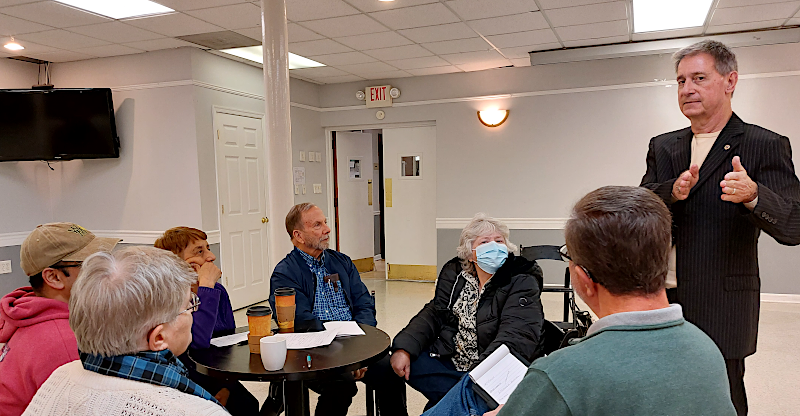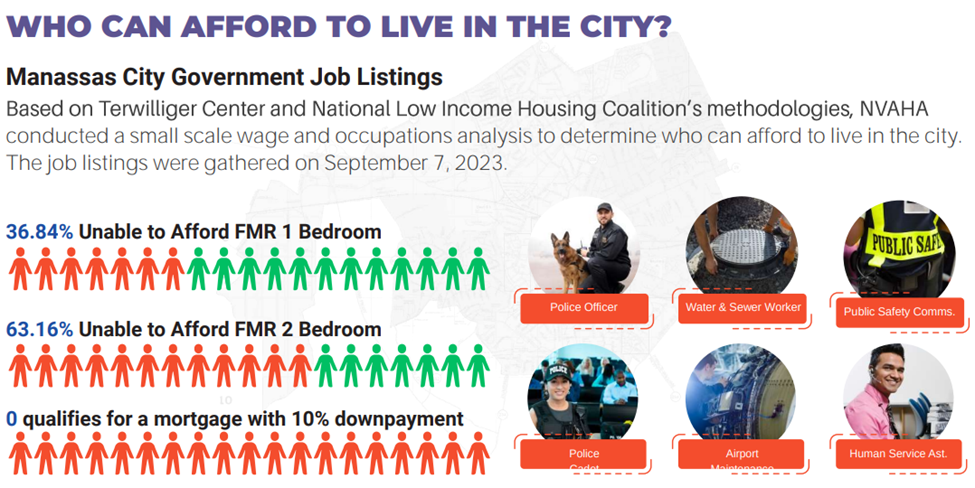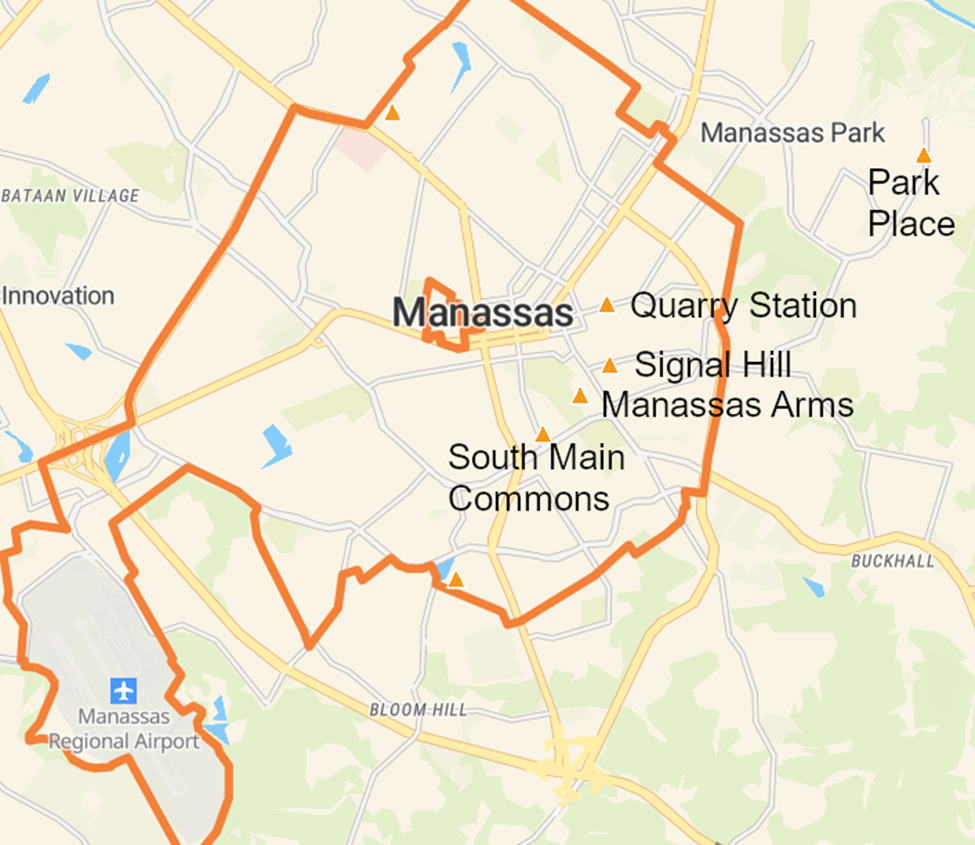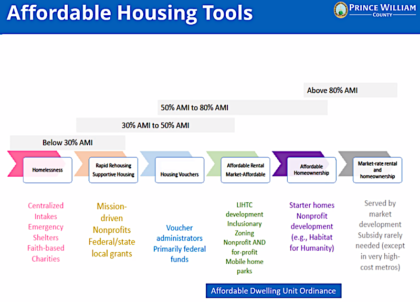Affordable Housing
Within Manassas and Manassas Park, BRUU’s affordable housing advocates are meeting directly with developers, key officials, and elected leaders.
Much of BRUU’s social justice work regarding affordable housing in Prince William County is channeled through Virginians Organized for Interfaith Community Engagement (VOICE). The county is currently drafting an Affordable Housing Ordinance (AfDU), so these are constructive times to engage in socal justice advocacy.
In 2024, the BRUU Housing Task Force is asking the City of Manassas to do the following:
– Create the position of Housing Coordinator
– Create a plan and strategy for affordable/attainable housing
– Identify where affordable/attainable housing could go, buy those properties and zone them accordingly
– Use the Housing Trust Fund to increase the number of owner-occupied units
– Partner with Manassas Park and Prince William County to coordinate the plan and obtain grant funding
A member of BRUU’s Social Justice Committee moderated the March 21, 2024 affordable housing discussion of the Committee of 100. One takeaway – at its April 22, 2024 budget hearing, City Council is expected to fund the housng cordinator position and add $1 million into the city’s Housing Trust Fund.
The FY25 City of Manassas budget, adopted by City Council, included funding for the Housing Coordinator.
To be addressed: accessory dwelling units. For background on “ADU’s,” check the Northern Virginia Housing Alliance June 2024 webinar on Accessory Dwelling Units, plus handouts on Accessory Dwelling Unit Matrix, ADU in ALX – Sam Shelby, and DC ADU Case Study – Max Pastore.
—————————————————————————————————————————————–
December 7, 2023 Housing Discussion
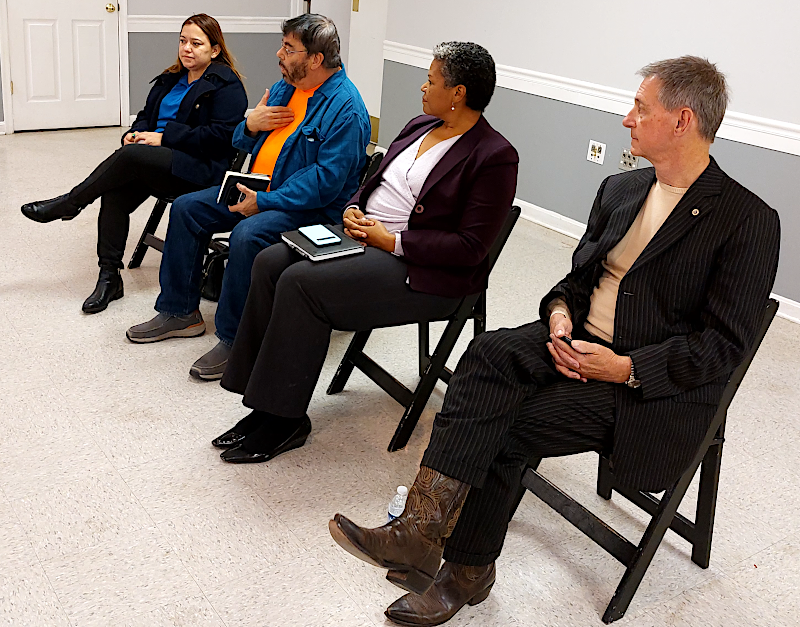 Sonia Vásquez Luna, Tom Osina, Del. Michelle Maldnado, and Mark Wolf on December 7
Sonia Vásquez Luna, Tom Osina, Del. Michelle Maldnado, and Mark Wolf on December 7
BRUU hosted a discussion on affordable housing in the City of Manassas on December 7, 2023. Speakers and listeners included Del. Michelle Maldonado, Sonia Vásquez Luna, Tom Osina, and Mark Wolfe from City Council, city planning commissionrs and staff, plus local residents.
We explored:
– What is the city’s responsibility to ensure there is enough affordable housing? How much is “enough”? Should the city have enough housing to match the number of jobs in the city that pay 80% or less of AMI?
– Where should the city plan for new affordable housing? Should Manassas partner with PW County and Manassas Park to plan for housing that might be in any one of the three jurisdictions?
– Should the city focus exclusively on rental housing, or also subsidize housing to help address wealth inequality and help low-wealth households start increasing wealth through projected increase in housing equity?
– What barriers can be removed or incentives added to make affordable / workforce housing easier to build?
BRUU members range across the socio-economic spectrum, but we all care about the challenge of creating an adequate supply of affordable housing in Manassas, Manassas Park, and Prince William County.
Housing is a complex issue. There is no silver bullet, no single solutions that would solve the problem if only social justice warriors would mobilize enough public pressure for elected officials to take action. Getting enough affordable housing in our community, and in the right places, will be a marathon and not a short sprint.
Starting in 2022, a group of BRUUers began meeting once a month to learn about the many existing Federal/state agencies and programs that deal with housing. (Interested? Contact us at housing@bruu.org)
We accepted Prince William County’s definition of affordable housing (“housing that costs 30% of the household’s annual gross income or less”) and chose to focus on the challenge for those earning 80% or less of Area Median Income (AMI).
We decoded acronyms such as LIHTC and started to understand which programs address which problems. In particular, we focused on what can be done at the local level to expand the supply of affordable housing units, and where our advocacy could make a difference.
It’s easier to recommend different solutions after clarifying the problem. Simply scattering new affordable housing units anywhere, far from affordable transportation, would be poor planning. As noted in Prince William County’s long-range 2040 Comprehensive Plan’s Housing Chapter:
It is generally recommended that the combined cost of housing and commuting should not exceed 42% of a households’ gross income. On average, transportation is the second largest household expenditure after housing, and transportation costs are directly impacted by the location of housing, specifically proximity to employment, schools, and other essential service destinations.
One of our initial successes in 2022 was getting the problem quantified in Prince William County’s 2040 Housing Chapter:
One challenge in dealing with affordable housing is the complexity of the government programs and the need to decode bureaucratic jargon. We finally figured out the number of units financed by the Low Income Housing Tax Credit (LIHTC) program in Manassas and Manassas Park, and when those units might be converted to market-rate housing:
22 units at Manassas Arms (financed via LIHTC in 1997, could be converted to market-rate rents in 2027)
82 units at South Main Commons (financed via LIHTC in 2000, could be converted to market-rate rents in 2030)
36 units at Signal Hill Apartments (financed via LIHTC in 2003, could be converted to market-rate rents in 2033)
148 units at Park Place (financed via LIHTC in 2004, could be converted to market-rate rents in 2034)
59 units at Oaks of Wellington (financed via LIHTC in 2005, could be converted to market-rate rents in 2035)
282 units at Brentwood (financed via LIHTC in 2009, could be converted to market-rate rents in 2039)
79 units at Quarry Station Seniors (financed via LIHTC in 2002, refinanced in 2023 to rehabilitate, could be converted to market-rate rents in 2053)
Source: NOVOGRADAC, LIHTC Mapping Tool
The shortfall in local affordable/workforce housing, requiring no more than 30% of a household’s income, is significant. In 2021, the Joint Legislative Audit and Review Commission (JLARC) calculated that Prince William County needed 8,800 more dwelling units (apartments/houses) to meet the demand for just the residents earning 50% or less of Area Median Income (AMI).
Even more units are needed to meet the demand for those earning between 50-80% AMI, and additional units for the residents earning 80-120% AMI (a category which was highlighted in Prince William County’s 2040 Comprehensive Plan). Building 8,800 more units would cost over $2 billion.
In 2023, the City of Manassas Housing Trust Fund had $2 million. Prince William County needed to re-rstablish its Housing Trust Fund before it could accept proffers tied to new zonings, but had $2.5 million from rezonings approved before the proffer law was revised by the General Assembly. In December 2023 the Board of County Supervisors allocated $5 million from the FY23 surplus to the county’s Housing Trust Fund.
The draft FY25 Budget proposed adding just county staff in FY25-26, then adding $5 million annually to the Housing Trust Fund in FY27-29. County staff also proposed an Affordable Dwelling Unit ordinance to be adopted by July 2024. That ordinance was required before making allocations from the Housing Trust Fund. VOICE has continued to press for adding $5 million/year to the Housing Trust Fund starting in FY25.
Most funding for affordable/workforce housing in Manassas, Manassas Park, and Prince William County come from Federal and State sources:
– US Department of Housing and Urban Development (HUD) Housing Choice (“Section 8”) vouchers provide a rent subsidy so people can afford market-rate apartments. In PW County, such vouchers provide $35 million to support 2,000 families.
– The Virginia Department of Behavioral Health and Developmental Services (DBHDS) has a state rental assistance program so people with developmental disabilities can live in their own rental units, and a Permanent Supportive Housing program. Additional support is available for veterans.
– The Virginia Homeless Solutions Program in the Virginia Department of Housing and Community Development deals with “rapid rehousing.”
– Virginia Housing manages the Low-Income Housing Tax Credit (LIHTC) program, subsidizing the construction of affordable housing units.
Resources
- AffordableHousing.com
- Families for Affordable Housing
- Housing Forward Virginia (and see Faith-Based Property Ownership in Virginia, November 2024)
- Prince William Area 2020-2024 Consolidated Plan
- Prince William Area Annual Action Plan
- Prince William County: 2040 Comprehensive Plan (including Housing, Land Use, and Mobility chapters)
- Prince WilliamCounty: Continuum of Care program
- Prince William County: Housing & Community Development
- Prince William County: Neighborhood Housing Rehabilitation Program
- City of Manassas Comprehensive Plan (including Housing and Neighborhoods, Land Use, and Mobility chapters)
- City of Manassas: Housing Office
- City of Manassas Park: Housing
- City of Manassas Park Comprehensive Plan (including Population and Housing, Land Use and Urban Design, and Transportation chapters)
- Greater Greater Washington: Affordable How”Sing”
- Metropolitan Washington Council of Governments (MWCOG): Housing Affordability
- Metropolitan Washington Council of Governments (MWCOG): Fair Housing Plan
- Metropolitan Washington Council of Governments (MWCOG): Regional Housing Targets
- Missing Middle Housing
- National Low Income Housing Coalition: Virginia
- Northern Virginia Affordable Housing Alliance (NVAHA)
- ProPublica – What You Need to Know About How Section 8 Really Works
- US Department of Housing and Urban Development (HUD): Virginia
- US Department of Housing and Urban Development (HUD): Fair Housing and Equal Opportunity
- US Department of Housing and Urban Development (HUD): Glossary of Terms to Affordable Housing
- VALegalAid.org: Housing
- Virginia Housing
- Virginia Fair Housing Office
- Virginia Governor’s Housing Conference
- Virginia Housing Search
- Welcoming Neighbors Network
Prince William County has identified a range of affordable housing needs, and various programs to address them:

